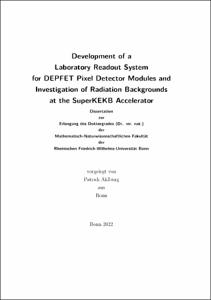Development of a Laboratory Readout System for DEPFET Pixel Detector Modules and Investigation of Radiation Backgrounds at the SuperKEKB Accelerator

Development of a Laboratory Readout System for DEPFET Pixel Detector Modules and Investigation of Radiation Backgrounds at the SuperKEKB Accelerator

| dc.contributor.advisor | Dingfelder, Jochen | |
| dc.contributor.author | Ahlburg, Patrick | |
| dc.date.accessioned | 2023-01-23T13:50:30Z | |
| dc.date.available | 2023-01-23T13:50:30Z | |
| dc.date.issued | 23.01.2023 | |
| dc.identifier.uri | https://hdl.handle.net/20.500.11811/10597 | |
| dc.description.abstract | With the upgrade from the e^+ e^- -collider KEKB to SuperKEKB, a 40-fold increase in instantaneous luminosity is targeted posing new challenges for the Belle II detector. Particularly the innermost detector layers, consisting of a silicon strip and Depleted P-channel Field-Effect Transistor (DEPFET) based pixel detector, operate in an environment of high event rates and increased background radiation.
In the first part of this thesis, the measurements of the FANGS detector are presented, which was one of five dedicated background monitors for the commissioning phase BEAST II of the SuperKEKB accelerator. Consisting of ATLAS hybrid pixel detector modules, the detector is suitable for studies under high radiation and particle rate especially caused by synchrotron radiation. The benefit of highly segmented sensors enables the spatial measurement of radiation present close to the interaction point. Furthermore, the capability of energy resolution using a precise charge measurement method is demonstrated. The second part deals with the development of the BDAQ-PXD readout system for single DEPFET pixel detector modules which are successfully operated in the innermost layers of Belle II. BDAQ-PXD is intended to be an easily accessible and adjustable laboratory test system for irradiation and test beam environments using the custom designed BDAQ53 readout board. The implementations of FPGA firmware, software and first measurements are presented. Within the scope of this work, the DEPFET sensor properties are investigated, e.g. hit-detection efficiencies and the influence of biasing voltages on charge collection. Specifically, a hit-detection efficiency of above 99.7% is measured confirming the functionality of the BDAQ-PXD system. | en |
| dc.language.iso | eng | |
| dc.rights | In Copyright | |
| dc.rights.uri | http://rightsstatements.org/vocab/InC/1.0/ | |
| dc.subject | Pixeldetektoren | |
| dc.subject | Siliziumsensoren | |
| dc.subject | strahlentolerante Detektoren | |
| dc.subject | Auslesesystem | |
| dc.subject | DEPFET | |
| dc.subject | SuperKEKB | |
| dc.subject | Belle II | |
| dc.subject | BEAST II | |
| dc.subject | pixel detectors | |
| dc.subject | silicon sensors | |
| dc.subject | radiation tolerant detectors | |
| dc.subject | readout system | |
| dc.subject.ddc | 530 Physik | |
| dc.title | Development of a Laboratory Readout System for DEPFET Pixel Detector Modules and Investigation of Radiation Backgrounds at the SuperKEKB Accelerator | |
| dc.type | Dissertation oder Habilitation | |
| dc.publisher.name | Universitäts- und Landesbibliothek Bonn | |
| dc.publisher.location | Bonn | |
| dc.rights.accessRights | openAccess | |
| dc.identifier.urn | https://nbn-resolving.org/urn:nbn:de:hbz:5-69408 | |
| ulbbn.pubtype | Erstveröffentlichung | |
| ulbbnediss.affiliation.name | Rheinische Friedrich-Wilhelms-Universität Bonn | |
| ulbbnediss.affiliation.location | Bonn | |
| ulbbnediss.thesis.level | Dissertation | |
| ulbbnediss.dissID | 6940 | |
| ulbbnediss.date.accepted | 19.10.2022 | |
| ulbbnediss.institute | Mathematisch-Naturwissenschaftliche Fakultät : Fachgruppe Physik/Astronomie / Physikalisches Institut (PI) | |
| ulbbnediss.fakultaet | Mathematisch-Naturwissenschaftliche Fakultät | |
| dc.contributor.coReferee | Gregor, Ingrid-Maria | |
| ulbbnediss.contributor.orcid | https://orcid.org/0000-0002-9832-7604 |
Dateien zu dieser Ressource
Das Dokument erscheint in:
-
E-Dissertationen (4400)




